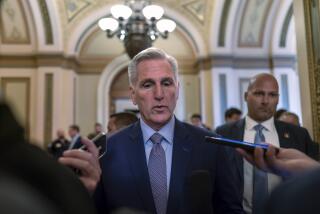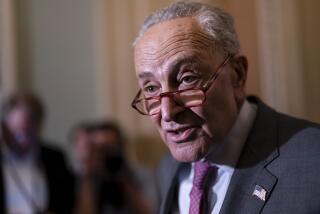Senate returns to Washington despite cityâs coronavirus spike and Congressâ stalemate
WASHINGTON â Senate Majority Leader Mitch McConnell is hauling senators back to Washington this week even as the city reports record numbers of new coronavirus cases and the two parties are mired in a stalemate over the next bill to respond to the COVID-19 pandemic.
Republicans have demanded that any new economic relief measure must shield businesses that reopen from liability against lawsuits brought by customers and employees. Democrats have balked, saying workers need more protection, not less. Their chief demand is $1 trillion for state and local governments burdened by burgeoning costs and plunging revenues.
âI see that as being a really tough bridge to gap,â Sen. Mike Braun (R-Ind.), said in a phone interview. âThe fact that [Democrats] said itâs a nonstarter on the liability protection, I donât think thatâs probably a good way to throw the gauntlet out there to challenge us to do something on state and local governments.â
With congressional leaders far apart and no serious negotiations underway, a new bill is likely weeks away. Further complicating matters, Republicans are newly reluctant to add to the nearly $2.8 trillion in coronavirus-related spending that Congress has already added to the deficit.
That hasnât stopped lawmakers from floating ideas for what theyâd like to see in another bill. Progressives want an additional $2,000 monthly for every American over 16 who earns under $130,000 a year. Democrats are also hoping to rescue the foundering U.S. Postal Service and encourage vote-by-mail for this fallâs elections.
Among Republicans, Sen. Mitt Romney of Utah has floated the idea of providing bonus pay for healthcare and grocery workers. Republicans more broadly want some way of condemning China for its role in the outbreak. There is bipartisan support for redirecting the nationâs medical supply chain away from China.
The particulars provide much to fight over. But even the question of whether Congress should return to Washington â and whether members should wear masks â has become partisan.
Bringing lawmakers back has been a clarion call for Republicans eager to reopen the economy and send the message that if healthcare workers and grocery clerks can do their jobs, so can their members of Congress. So the Republican-controlled Senate is returning, while the Democratic-led House â on its doctorâs advice â is not.
âThis idea that weâre going to hunker down and shelter in place for an indefinite period of time is just inconsistent with the reality of us needing to do our job,â Sen. John Cornyn (R-Texas) said.
The handful of Republicans in the Capitol recently for brief sessions mostly have not worn masks, while most Democrats have. Masks will be encouraged but not required in the Capitol this week.
Congressâ Office of the Attending Physician has instructed senators to maintain social distance, limit the number of staff in their offices and self-monitor for symptoms. Republicans say those steps are enough to ensure the Senateâs safety.
Senators will not be routinely tested for the virus. Concerned with those optics, President Trump on Saturday tweeted that there are enough Abbott-branded tests for senators to be tested â and for the House, too.
âThere is tremendous CoronaVirus testing capacity,â he wrote, adding that the same is true for âthe House, which should return but isnât because of Crazy Nancy P.â
With rare unanimity, House Speaker Nancy Pelosi (D-San Francisco) and McConnell (R-Ky.) in a statement jointly declined the offer for rapid-result coronavirus testing at the Capitol. Acknowledging that testing nationwide is still âcontinuing to scale up,â they said that Congress would prefer to âkeep directing resources to the front-line facilities where they can do the most good the most quickly.â
Pelosi is not bringing the House back until May 11 at the earliest, based on the attending physicianâs advice.
Sen. Dianne Feinstein (D-Calif.), who at 86 is the oldest senator, said McConnell should reconsider because bringing the Senate back is ânot worth the risk.â Despite her opposition, Feinstein, who has been working out of her San Francisco home, plans to return to Washington for votes, according to a spokesman.
Feinstein, like many other Democrats, says Congress needs to work remotely, partly to set an example for the country. Democrats are also furious that McConnell is convening the Senate to further his personal goal of filling administration and judicial vacancies â not to respond to the coronavirus crisis.
On tap for the Senate are votes to confirm the inspector general of the Nuclear Regulatory Commission and other Trump nominees whom McConnellâs office says are âmission-critical COVID-19â or national security nominees. The Senate is also expected to debate reauthorizing previously expired rules allowing the federal government to eavesdrop on citizens.
One Senate committee will consider a controversial nomination of a McConnell protege to the U.S. Circuit Court of Appeals for the District of Columbia, while another will hear from White House coronavirus task force member Dr. Anthony Fauci. House Democrats blasted the White House for allowing Fauci to testify in the GOP-controlled Senate but blocking him from appearing before one of their committees.
No coronavirus-related legislation is expected in the Senate this week, but negotiations might begin.
McConnell, having previously said that state and local governments should be allowed to declare bankruptcy, suggested last week that aid for them would get through the Senate only if Democrats agreed to the liability waivers for business owners. He called his condition a âred line.â
âThe Senate is not interested in passing a bill that does not have liability protection,â McConnell said in an interview on Fox News last week. âThatâs an integral part of our economy getting back to normal. Weâre getting back to work.â
Democrats are dubious at best.
Senate Minority Leader Charles E. Schumer (D-N.Y.) said that allowing business owners to call workers back without adequately protecting them âmakes no sense.â
Tort law already protects companies from frivolous lawsuits and Congress should leave it to judges and juries to decide if companies put employees and customers at risk, said Rep. Ted Lieu (D-Torrance). âI think it would be difficult for the House of Representatives to shield businesses from negligence,â he said, âespecially if it results in people getting sick or getting killed.â
States and local governments have already begun layoffs. Last month, Los Angeles Mayor Eric Garcetti warned that the economic downturn facing Los Angeles will be more painful than the 2008 recession, requiring cuts to government programs and the furlough of thousands of city employees.
Democrats argue that cities and states need the money to keep healthcare workers and first-responders employed. The next package must include ârobust funding for state and local governments to pay front-line workers,â Pelosi said in a press call. âGovernors and mayors, Republicans and Democrats, are crying out for support.â
Democrats also want to expand the number of cities that are eligible. The earlier CARES Act allowed cities with populations of 500,000 people or more to qualify for direct aid, but Democrats say that excludes many cities and should be expanded to those with at least 50,000 residents.
Orange County is the sixth most populous county in the country, Rep. Katie Porter (D-Irvine) said, âand yet we donât have a single city thatâs over half a millionâ people.
House Republicans have signaled a potential opening in the stalemate. Minority Leader Kevin McCarthy (R-Bakersfield) said Congress would need to limit how states and local governments can spend any aid, to ensure they donât use it to fix pension liabilities or other budget holes that existed before the COVID-19 pandemic.
âIf I just sent that money directly to Sacramento, would Bakersfield or Porterville or Lancaster ever get that money they need for their first-responders or others?â he said. âShow me the challenge and the account, the financial risk of what took place during COVID, and letâs put it appropriately to what weâre dealing with.â
More to Read
Get the L.A. Times Politics newsletter
Deeply reported insights into legislation, politics and policy from Sacramento, Washington and beyond. In your inbox three times per week.
You may occasionally receive promotional content from the Los Angeles Times.












